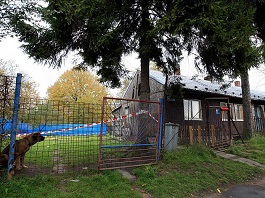
Ostrava is preparing a transformation of the Bedřiška residential colony
 |
The city now has an urban study that proposes another way to develop the area. Its transformation should be divided into several phases, and the city anticipates that comprehensive completion will take ten years or more. However, preliminary work could begin as early as the following year.
The district council originally intended to transform the area into better quality housing and wanted to offer it to investors. It counted on relocating existing tenants, against which there was a wave of resistance, and the city intervened in the situation.
"We want to utilize the energy of the local community and the work they have already done to provide them with some opportunity for a valuable future life in that place," said Macura. According to him, it is also a very promising location in terms of placement because it is close to nature.
The resulting study proposes which buildings can be preserved, which will need to be replaced, and where entirely new buildings can be created. The character of the proposed new houses is derived from elements of Finnish house architecture. It also includes the removal of barriers to people’s movement and better connectivity of the area with its surroundings. A shop and a restaurant could also be newly included in the colony. The study addresses the appearance of public spaces, the details of streets and new squares, as well as the addition of greenery.
"We have an urban study that outlines how to behave in that area. One of the first steps at this moment is preparing a legal model for the establishment of a social cooperative," said Deputy Mayor Zuzana Bajgarová (ANO). Under this cooperative, existing tenants could initially operate. Through it, they could begin renovations of existing houses, which they could partly finance themselves, perhaps even with the help of subsidies. The city expects that the social cooperative could be established in the spring of next year.
"In addition, we will commission the project documentation for the first phase, which will mainly be based on the technical and transportation infrastructure in the area," Bajgarová stated. The city expects that new houses could start being built in the area within three years. In addition to funds from the city budget, the city would like to obtain grant money for the transformation of the area or invite the private sector to collaborate.
It is expected that the first phase will cost approximately 100 million crowns. The city is also having a social study processed, which should show what the optimal structure of residents would be in the area where 58 people currently live.
The English translation is powered by AI tool. Switch to Czech to view the original text source.
0 comments
add comment
Related articles
0
08.12.2025 | Machines demolished a house in the Ostrava settlement of Bedřiška, its supporters protested
0
08.12.2025 | In the Bedřiška colony, the demolition of a house that was previously defended by activists has begun
0
25.11.2025 | Residents of Bedřiška are calling on the city and the district for further discussions about the fate of the location
0
14.11.2025 | Supporters of Bedřiška protested for several hours on the roof of a building slated for demolition
0
28.08.2018 | Architects are looking for an alternative rescue plan for the settlement of Bedřiška
0
08.02.2018 | City Hall wants housing for young people in the Ostrava locality of Bedřiška









